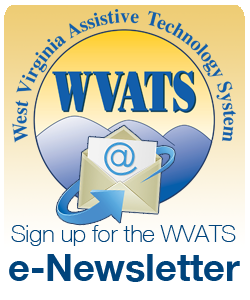Winter 2018

Download a PDF of this Newsletter
Articles:
- Disasters Happen - Are You Ready?
- Protection and Advocacy for Beneficiaries of Social Security
- Powerful Tools
- Farm and Garden
- In Memory of Regina Mayolo
Disasters Happen
- Are You Ready?
Emergencies and disasters can strike quickly and without warning. This may force people to quickly leave or be confined in their home unexpectedly. For many people who have disabilities, emergencies, such as fires and floods, present a real challenge. Users of assistive technology devices may have additional challenges. It is important to know your needs and have a plan in place.
It is not always possible to take all of your equipment with you if you need to evacuate. There may not be room or access for large or heavy items such as power wheelchairs or lift systems during an emergency evacuation. Oxygen and dialysis systems are also at risk. Make a plan for larger equipment that is required for mobility or medically necessary. If possible, have backup equipment in a safe, secure location. If backup devices are not an option, consider lighter, low-tech options such as a manual wheelchair.
It is also important to consider devices powered by electricity. Disasters often leave communities without power for long periods of time. Having a generator or battery backup for these devices is important to consider. For communication systems, consider having a low-tech backup such as a laminated basic communication board.

While planning for your equipment needs, it is also important to consider where you will go. If you plan to shelter with family or friends, consider your needs in that environment. Will you need a bath chair, grab bars or adapted eating utensils? Can you store an extra set of these items in their home?
If you are planning to use the local emergency shelter, contact the local emergency management office. Discuss your needs with them to make sure the shelter can accommodate you. Also ask about assistance programs. Many communities ask people with a disability to register with the local fire or police department or emergency management office. This allows help to be provided quickly in an emergency. If you are electric-dependent, be sure to register with your local utility company.
For more information on developing an emergency plan, visit redcross.org or contact your local emergency management office.
WVATS News
Protection and Advocacy for Beneficiaries of Social Security
Disability Rights of West Virginia (DRWV) is the federally mandated protection and advocacy system for people with disabilities in West Virginia. One of DRWV’s federally funded programs is Protection and Advocacy for Beneficiaries of Social Security (PABSS). PABSS was established by the Ticket to Work and Work Incentive Improvement Act of 1999 for individuals with disabilities who receive Supplemental Security Income (SSI) or Social Security Disability Insurance (SSDI) who want to work or return to work.
DRWV may be able to help you remove barriers to employment, including:
- Accommodation(s) in the workplace
- Need for assistive technology
- Transportation issues
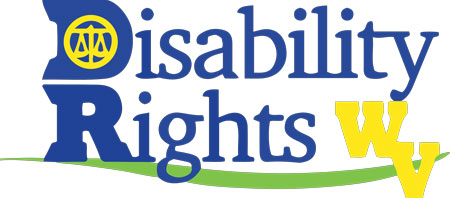 Health-related issues
Health-related issues- Employment discrimination
- Lack of job training or education
- Disclosure of disabilities
- Understanding work incentives
- Understanding your rights as a job applicant
- Understanding Plans for Achieving Self-Support (PASS)
- Transition services from school to work
Please call DRWV at 800-950-5250 if you have any questions about transitioning from school to work, gaining/maintaining employment or returning to work. Visit DRWV online at drofwv.org.
Fair Housing FIRST
Most people understand, when it comes to housing you cannot discriminate. This includes discrimination based on race, religion, color, sex, national origin, familial status or disability. Did you know the Fair Housing Act also sets standards for the design and construction of multifamily housing buildings? These standards are sometimes confusing for the people who live in the buildings. It can also be confusing for those who are designing or building them. To help, Department of Housing and Urban Development (HUD) funds Fair Housing Accessibility FIRST. This technical support group can answer questions from individuals and builders. They also provide training on the seven design and construction requirements of the Fair Housing Act. The trainings and webinars are free. For more information, call them toll-free at 888-341-7781 (V/TTY) or visit fairhousingfirst.org.
AT and Me
WVATS wants to hear from you. Has AT made a difference in your life, education, work or community? Did a temporary AT solution help you in a situation? Tell us about it. Submit your story and photos to wvats@hsc.wvu.edu or call 800-841-8436. You could be featured in a WVATS newsletter.
Powerful Tools
Available for Loan
WVATS offers many assistive technology solutions that may help in an emergency or assist in the colder months. Below are a few items available for loan. Contact WVATS to find out more about the loan library program.
Go Talk 20+

The Go Talk 20+ is a communication device with 25 cells. The device has five recording levels, allowing for 100 messages. The top row has five core message cells that stay the same on each level. These are often used for important words or phrases the user always needs access to. They may include messages such as bathroom, help or drink. A built in key guard can help those with limited mobility or fine motor limitations access the correct cell.
Hisonic Waist Band Amplifier
Hisonic Waist Band Amplifier is a personal speaker system that can help make your voice louder. The system may help someone with low volume speech and keep someone from straining their voice. Speech is picked up by talking through either a headset or a lapel mic. The voice can be boosted to a max volume of 16 decimals.
Adaptive Snow Sled
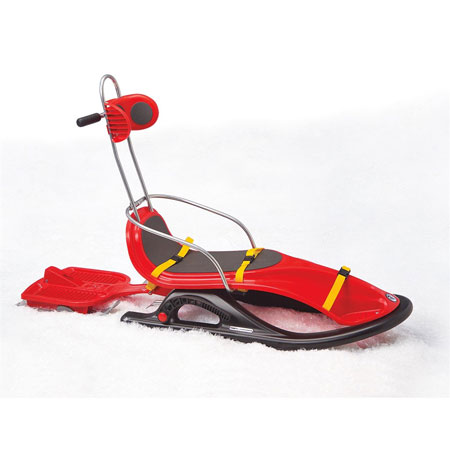
Adaptive snow sleds provide a padded seat, three safety straps, raised back support, headrest and steel runners to help with safety. Many are ergonomically shaped and have footrests. Some adaptive sleds provide a rear section for an additional rider.
For more information, visit flaghouse.com or call 800-793-7900.
Powerful Tools
Shovelution
Shovelution attaches to your snow shovel around the shaft. It provides an extra handle that flexes while needing less energy per load. The motion of this shovel adapter may help prevent injuries from twisting and bending your back. The Shovelution adapter can be attached to other lawn tools. For more information, visit shovelution.com or call 484-237-8567.
Ice Gripper for Canes and Walkers
Ice grippers are an attachment for a cane or walker when it starts to get icy outside. Ice grippers fit to the end of canes or walker legs to help with stability. The Ice Gripper also folds in for indoor use with a flip of a switch.
Battery Heated Gloves
Battery heated gloves may be useful when the weather gets colder. These gloves can be comforting to people with arthritis or poor circulation, providing warmth to their hands. Battery heated gloves have conductive thread on the index finger and thumb so that touch screens can be used while being worn. An on and off switch operates each glove. For more information, visit thewarmingstore.com or call 888-406-1984.
These tools are available for short-term loan and/or demonstration through the WVATS Loan Library. For more information, or to borrow these items, visit vll.cedwvu.org or call 800-841-8436.
Farm and Garden
Winter Care for Livestock
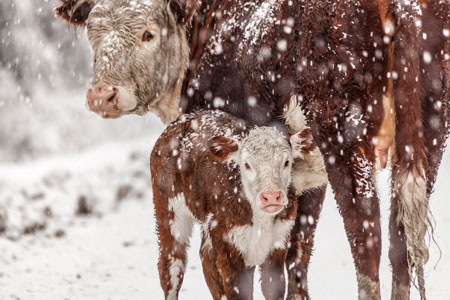
Winter weather is approaching, and it is time for farmers to work on winter plans. Cold temperatures bring added stress on livestock. Livestock use more energy as they adjust to temperature changes, wind, snow, rain and mud. A strategy for dealing with the cold weather is to feed at night. The heat from digestion peaks a few hours after a meal. Offering meals in the evening can help livestock cope with the cold nighttime temperatures. Portable feeders may be helpful with feedings that can change with the temperature.
Making sure that each animal has water is a daily chore. The use of heated tanks may help ensure that freezing does not take place. A heated hose can help provide a way to get water to animals without having to carry heavy buckets. Call WV AgrAbility at 800-841-8436 to learn more about winter care tips.
Sportote Feed Cart
The Sportote Feed Cart may help with feeding multiple animals. Three compartments allow you to store different types of feed. The bin holds up to 250 pounds and has a grip handle. The legs are molded to the cart to make it more stable when rolling on two wheels over rough terrain.
For more information, visit valleyvet.com or call 800-419-9524.
PIRIT Heated Hose
The PIRIT Heated Hose works in below freezing temperature anytime you run the water. It is made with PVC materials approved by the Food and Drug Administration (FDA) for potable water. This can be helpful for those who cannot carry heavy water buckets from stall to stall.
For more information, visit pirithose.com or call 888-747-4844.
Prepare a Farm Emergency Kit
When making a disaster plan, it is important for farmers to plan for their animals as well as their families. Farmers may need to relocate or release animals during flooding or other dangerous situations. These situations usually do not provide farmers with a lot of time to prepare. It is important to prepare ahead of time and have a plan in place. Here are some planning tips.
Make an emergency kit for your farm so you have emergency supplies, and let everyone know where it is. Check and update contents regularly. Include the following items and personalize according to your needs:
- Current list of all animals, including their location and records of feeding, vaccinations and tests. Post this information at different places on the farm.
- Supplies for temporary identification of your animals, such as plastic neckbands and permanent markers to label animals with your name, address and telephone number.
- Basic animal first aid kit.
- Handling equipment such as halters, cages, blankets and tools for each kind of animal. Include bolt-cutters to quickly free animals in an emergency.
- Water, feed and buckets. Tools and supplies needed for sanitation.
- Other safety and emergency items for your vehicles and trailers.
Checklist
- List of animals
- Location and records of feeding of animals
- Temporary identification for animals
- Animals first aid kit
- Handling equipment
- Water and feed buckets
- Sanitation items
- Safety and emergency items for trailers
AgrAbility National Training Workshop (NTW)
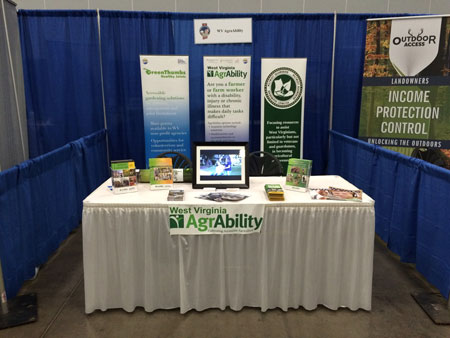
Save the date for the 2018 AgrAbility National Training Workshop. This year’s conference will be held at the Westin Portland Harborview Hotel in downtown Portland, Maine, on March 19-22, 2018. The NTW is an educational event speaking about issues related to disability in agriculture.
For more information, visit agrability.org or call 800-825-4264.
In Memory of Regina Mayolo

WVATS and the disability community suffered a great loss with the passing of Regina Mayolo on October 12, 2017. Gina was a passionate advocate for disability rights and an irreplaceable resource in the areas of fair housing, community living and assistive technology. She not only worked parttime for WVATS at the Center for Excellence in Disabilities at WVU, but also worked tirelessly for the Community Living Initiatives Corporation and a free clinic near her hometown in Pennsylvania. Gina was a lover of music, movies and books; an avid gardener; a baseball and hockey enthusiast; and above all else, an amazing friend. She loved big and laughed often. Gina was always willing to lend a hand, an ear or whatever else might be needed.
As we move forward, we will do so with Gina in our hearts. We will think of her as we continue to serve the disability community and find comfort in carrying on her passion for this work.

